Share
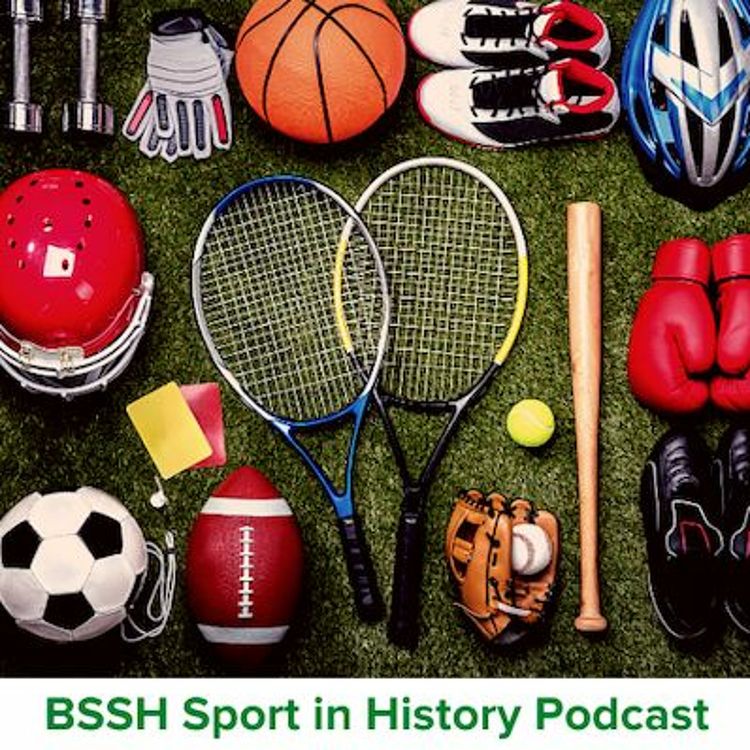
Sport in History
Seth Tannenbaum on The Historical Marginalization of Black Fans at Major League Baseball Games
•
While the decline in Black American baseball players has received lots of scholarly attention in the last three decades, scholars have not spent as much time studying the decline of Black American fans at Major League Baseball (MLB) games. The few of examinations of the number of Black American fans at MLB games that exist tend not to take the structures of the fan experience at MLB games into account. In contrast, this paper examines that experience, which reveals that the persistent, but adaptable, marginalization of Black fans at MLB games—from describing them differently, to treating them differently, to segregating them, to building new ballparks far removed from Black communities, to not marketing to Black audiences, to making it difficult for Black fans to reach games—is a major contributing factor to the disproportionately low number of Black American fans at MLB games today.
More episodes
View all episodes

The treatment of sports injuries in the Republic of Ireland, 1950-2010: A History
48:08|This paper examines the provision of sports injury treatment in the Republic of Ireland during the period from 1950 until 2010. By the late 1960s, talks on the prevention and treatment of sports injuries were being held sporadically. How initial centres for the specialised treatment of sports injuries were developed in the 1970s is assessed. Sports related physiotherapy and professional treatment became more common by the early 1980s. In 1981, a government-backed investigation into sports injuries began, while the Irish Sports Medicine Association was also founded that year. With an increase in participation in sport, injuries had become more common. The main findings of the Sports Injuries Committee, completed in 1984, are identified and it will be shown that despite their recommendations, issues remained at grassroots level. It was not until 2005 that plans for a major specialised centre for the treatment of sports injuries in Dublin were announced.Dr Conor Curran is an independent historian who has published extensively on the history of sport and society in Ireland. His new book, Blue Chippers from the Emerald Isle: A history of Irish footballers and scholarships in the USA in the twentieth century, will be published later this year by Peter Lang.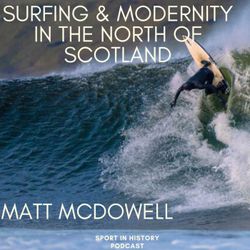
Matt McDowell on Surfing & Modernity in the North of Scotland
01:04:19|New podcast host and Editor Max Portman talks to Dr Matthew L McDowell about Dr McDowell's new book 'Surfing and modernity in the North of Scotland', published in September 2024 with Cambridge Scholars Publishing. The book discusses the existence and evolution of surfing in the region, from the 1960s to the present day. It does not, however, focus just on surfing: it also acts as a history of the region itself, and examines the possibilities and limits of surfing, sport, and activities like them being used as a means of reinventing communities.These are all themes that Max and Matt cover in their interview as they discuss the global and local cultures of surfing, the history of the Caithness and Sutherland Regions and how Ceefax (remember Ceefax?!) & the BBC weather report were useful tools in a surfer's arsenal. We also talk about the Sport, “islands”, people, and politics conference that Matt is organising on Scottish island of Orkney in June 2025. All in all, it's an hour's worth of insightful research on an under-developed part of Sports History.About Our guest: Dr Matthew L. McDowell is a Lecturer in Sport Policy, Management, and International Development at the University of Edinburgh, Moray House School of Education and Sport. He is the author of A Cultural History of Association Football in Scotland, 1865-1902 (2013), and an editor of The International Journal of the History of Sport. Previously, Matt was Chair of the British Society of Sports History (2017-19) and an editor of Northern Scotland (2020-23) and has a PhD in Scottish history from the University of Glasgow. His other publications examine a variety of phenomena in the history of Scottish, British Empire/Commonwealth, and Atlantic Rim sport, including: football, sporting events, lifestyle sport, curling, and sport’s relationship with politics. Matt is originally from New Jersey he has resided in Scotland for almost twenty years.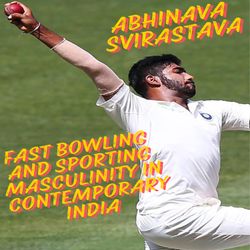
Abhinava Srivastava on Enacting ‘speed’ as Samman (honour): Fast bowling and sporting masculinity in Contemporary India
40:42|In this seminar paper, the enabling potential of ‘speed’ is theorized to study how bowling fast on cricket field has increasingly allowed a section of working-class and lower-middle class young Indian males to assert their claim over the metropolitan and cosmopolitan world of the game in contemporary India. The argument developed in this paper is how a bodily ideal and aspiration espoused by a group of working-class fast bowlers can be taken as a form of negotiation and upward mobility as against to an elite, upper-caste bodily ideology celebrated and enthusiastically embraced by batters. It begins by examining how the problem of not having enough fast bowlers shaped the colonial and postcolonial imagination on a discursive level. The chapter then attends the possibilities inaugurated by the raftaar (speed) for a group of interlocutors to theorize their bodily-world and the various alternative meanings they deploy to challenge dominant, upper caste masculinity and claim national and international stage of the game. Abhinava Srivastava is a fifth-year PhD scholar in the department of sociology at Shiv Nadar University, Greater Noida, India. His research project is centred on locating postcolonial subjectivities through an ethnographic encounter with India’s rapidly changing ‘Cricket Culture’. His thesis explores meanings, values, and claims that are produced through the appropriation of the game at various demographic level that range from the international to local. Such an exploration offers a promising account of the distinct cosmopolitan sensibility, idiom and expectation around Cricket Culture that goes into the making of new postcolonial culture and social identity in India.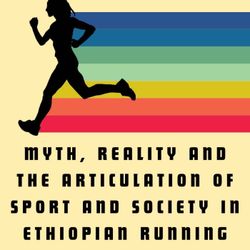
Michael Crawley on Myth, Reality and the Articulation of Sport and Society in Ethiopian Running
40:05|Taking inspiration from Derek Birley's 'The Willow Wand,' this talk begins by exploring some of the myths surrounding Ethiopian running. Michael Crawley explores some of the insights gained through 15 months of ethnographic fieldwork with marathon runners in Ethiopia. In particular, he argues that Ethiopian runners understand 'energy' to be a limited resource, which makes training together, and the social relationships necessary to do this well, particularly important. Towards the end of the talk, he explores the articulation of change in sport and broader society in relation to Ethiopian running and endurance sport more broadly. Dr Michael Crawley is a social anthropologist and Assistant Professor at Durham University. His first book, 'Out of Thin Air: Running Wisdom and Magic from Above the Clouds in Ethiopia' won the American Anthropological Association's Margaret Mead Award in 2022. His current work is on endurance sport, self-tracking technologies and performance enhancement in cross-cultural comparison. His sophomore book 'To the Limit: The Meaning of Endurance from Mexico to the Himalayas' is due to be published with Bloomsbury Sport on the 12th of September 2024.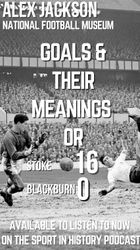
Alex Jackson on “Goals and their meaning”: The meaning of one wartime game. Or: Stoke 16 Blackburn Rovers 0
38:56|How can we understand the meaning of wartime football? This talk tries to tackle a small part of this question by exploring the history and contemporary reception of one wartime result. In doing so, it aims to illustrate some of the influences on Football’s Great War by writers like Tony Mason, Mike Huggins, and Adrian Gregory, and how they helped shape an approach to tackling this question.This talk reflects on how the result came about, how people reacted at the time, and how this was shaped by their understanding and experience of sacrifice during the First World War. In doing so, it will also explore how Edwardian ideas and concepts of amateurism and sportsmanship shaped, and in turn, were reshaped by wartime conditions.Dr Alexander Jackson has been a curator at the National Football Museum in Manchester since 2011. In 2014 he was the lead curator for the Greater Game: Football and the First World War. This inspired research that led to Football’s Great War: Association Football on the English Home Front, 1914-1918 (Pen & Sword). In 2023, he was one of 10 individual winners in the National Archive’s These Streets local history competition. He welcomes any interest in the NFM’s collections and helps support researchers wishing to use them.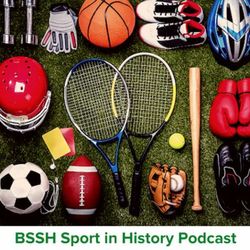
David Horspool at Chalke History Festival
14:29|Our Friends over at the History of Jackson have been kind enough to share this short podcast interview with David Horspool with the Sport in History Podcast, with Jackson Van Uden, founder of History with Jackson, interviewing David at Chalke History Festival about his book 'More Than a Game: A History of How Sport Made Britain' published in late 2023 by John Murray Publishing. 'More Than A Game' is available now to purchase in hardcover and paperback versions online and from all retail booksellers.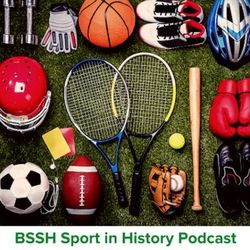
‘Don’t worry!’: Sam Oldfield on The rise of netball and international governance 1926-1963
40:33|Throughout the twentieth century women’s rights to compete in sport at international level started to be realised, with major tournaments and competitions starting to, reluctantly, open their doors to female athletes. Nonetheless, this battle had been difficult and long for many women’s sporting organisations who relied on dedicated committee members to push forward an international playing agenda. Formed in 1926, the All England Netball Association (AENA) was the first dedicated governing body for the sport, aiming to expand netball’s reach by providing opportunities for girls and women to participate in such activities beyond the confines of the schools within the United Kingdom by disseminating rules and establishing competition across the Commonwealth. However, with no globally agreed laws, there was difficulty providing international competition. To unify netball, the AENA committee brought together key netballing figures from across Australia, New Zealand, Ceylon, South Africa and the West Indies in the hope of agreeing a new version of the game for international dissemination. This was realised in 1960 when the International Federation of Netball Associations (IFNA) was established, with AENA members being awarded selection of the first officers as a tribute to their dedicated work in bringing many netballing nations together. This paper will explore the development of netball’s international governance, considering the efforts of the AENA committee in creating a unified voice for netball. Samantha-Jayne Oldfield is a senior lecturer in sport history and the sociology of sport at Manchester Metropolitan University. She is an associate editor for Sport in History and is an academic consultant for England Netball’s netball heritage and archives group. A founder of the Netball History Network, she is committed to establishing an international community of netball scholars and publications, whilst developing her own research project surrounding the founding women of England Netball and the construction of a more comprehensive history of the organisation.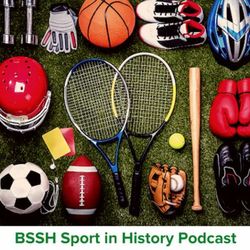
How cricketers navigate class connotations of traditional cricket kit relating to identity & place
30:06|This emerging, ongoing research project delves into the historical influence of class distinctions on cricket in Greater Manchester, focusing on grassroots cricketers and their connection to their playing kit. With a background as a Salford native, the researcher is intrigued by the interplay of sport and social class, especially through the lens of cricket attire. Leisure time is a realm where symbols can easily shape social status, offering temporary social mobility away from work (Joseph, 1986). This study delves into the cricket kit as a semiotic sign, unveiling hidden narratives about class identity and cricket, primarily in Greater Manchester. It also explores how urban cricket integrates into the local culture. Material methods, particularly material collections (Holmes and Hall, 2020), have significantly influenced the research. The project treats the cricket kit bag as a collection and seeks to reveal personal connections to cricketers' kits, shedding light on how identity and place inform this collection. A reflexive mode of documentary practice is employed to critically examine the researcher's role in shaping and representing the research. This approach involves self-awareness and scrutinizes the researcher's impact on the subject matter and its interpretation by the audience (Nichols, 2017). In summary, this research project aims to offer a diverse urban perspective on the intricate relationship between sport and social class by exploring the class connotations of the traditional cricket kit and its significance to Greater Manchester club cricketers. Danny Orwin is an Early Career Researcher and Fashion Film Lecturer at Manchester Fashion Institute, Manchester Metropolitan University. My research stems from an interest in the role of filmmaking in investigating fashion cultures, and how through exploration of this, themes of place and identity can be revealed.